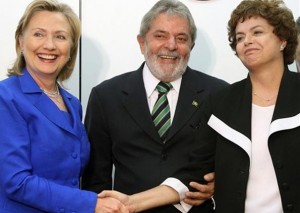
U.S. Secretary of State Hillary Clinton participated in a townhall of sorts at Zumbi dos Palmares University in São Paulo last Wednesday, March 3rd. This is a format that Secretary Clinton has used around the world to conduct “public” diplomacy and try to connect to local constituencies, especially women and young adults. The townhall is available for viewing (see below) and in many ways it is worth the watch.
Secretary Clinton at Zumbi dos Palmares University
Secretary Clinton was well received by Brazil’s original “afro-brazilian” college, but the cordial, but crisp criticism of U.S. policy was evident throughout the show. The first question drove straight to the current “disagreement” over relations with Tehran and the nuclear question. Secretary of State carefully navigated the inquiry by suggesting that both countries share the same goal of stopping Tehran from obtaining nuclear weapons, and suggested that negotiations depended on “pressure,” implicitly alleging that Brasilia was “light” on Tehran.
Several of the questions revolved around the lack of change in U.S. policy toward Latin America and Brazil after Obama’s election to the U.S. presidency. The Secretary said that change was “hard” and “takes time.” While she reiterated the Obama’s dedication to changing relations with Latin America, and pointed to cooperation to create greater gender equality and address climate change, her remarks did not point to any groundbreaking changes or substantive discussions over issues such as trade, non-proliferation, or energy and climate change.
She did promise greater educational exchanges, including English scholarships for students at Zumbi dos Palmares provided by U.S. headquartered corporations operating in Brazil. BrazilWorks will certainly follow up and track new efforts to expand educational exchanges.
Moreover, the immigration question was asked, demonstrating Brazilians’ widespread frustration with U.S. immigration policies. While she indicated that the Obama administration wants greater exchanges between Brazilians and North Americans, and mentioned the very few operating U.S. consulates (São Paulo, Rio and Recife)… she did not offer any concrete improvements in this vital area to Brazilians with family and business connections in the U.S.
Overall, the Brazilians participating in this special event demonstrated both respect for Hillary and a cordial perspective with respect to U.S.-Brazil relations. Yet, behind most of the questions was suspicion over the willingness of the U.S. to change, to extend itself to forge stronger ties with the region and Brazil, and a doubt about U.S. leadership at such a critical time in the world and a special moment for Brazilian national development.
In so many ways this event mirrored bilateral relations today, cordial, but increasingly thorny as an accumulating list of important issues, from immigration to international trade and non-proliferation, lead more and more Brazilians to the conclusion that the United States is part of the problem, not the solution.